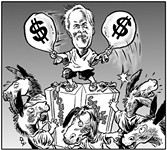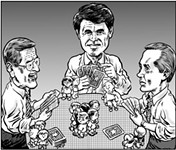Capitol Chronicle
The Legacy of Henry B. Gonzalez
By Michael King, Fri., Dec. 8, 2000

I met Congressman Henry B. Gonzalez only once, for a brief moment in the summer of 1993. He was attending a Houston hearing on public housing at Allen Parkway Village, as part of his personal, hands-on -- and yes, quixotic -- effort to save the once-model housing project doomed by its proximity to prime downtown real estate. Big Houston money wanted APV gone, so eventually it would go. But not before Henry B., the San Antonio Don de la gente, did what he could to name, if not prevent, yet another tyrannical act of institutionalized, monied vandalism masquerading as urban renewal.
When Gonzalez arrived on the grounds of APV, he was immediately surrounded -- not by reporters or politicians, but by neighborhood people: ordinary folks who wanted to say hello, to exchange a few words with a legend, to ask Mr. Gonzalez if he would listen to their complaints about their treatment at the hands of city bureaucracies and public officials. Henry B. listened. Although the Houston sun was high and merciless, although the meeting was already behind schedule, although his district was four hours away, and although some of the complaints had nothing to do with his immediate business -- he politely shook hands, he listened, he offered words of comfort or encouragement.
I recalled a line out of Ezra Pound: "They will come no more, the old men with beautiful manners." Pound was writing about destitute London pensioners at the turn of the century. Yet here was Henry B., a kindly if often gruff San Antonian nearly a century later, proving the poet wrong. In the words of his friend and colleague, former state representative Tony Korioth, "I never met anyone who was mad at him. He didn't beat up on people. He sort of represented his position and did it with a smile on his face."
The old man with beautiful manners is gone. He passed over Nov. 29, 2000.
Of course, Gonzalez didn't always employ beautiful manners. I'm not thinking of the most celebrated incidents: the now reflexively legendary public punches Gonzalez threw when somebody called him a communist. Rather, I'm recalling those moments of courageous public service when Henry B. Gonzalez refused to be polite about injustice: when he refused the cowardly impulse to ignore outrage and to speak, instead, politely; when he refused to pretend that everybody, even the polished tyrant and the well-mannered bully, means well; when he refused to go along to get along.
The most famous such moment, of course, is state senator Gonzalez' heroic 1957 stand against segregation, when he led a filibuster in the Texas Senate against its "Southern manifesto" and the official white supremacist defiance of the civil rights movement. He was a fearless member of that courageous generation that made it no longer respectable to defend segregation. Gonzalez was as important in his person as in his politics, says Andy Hernandez of San Antonio's St. Mary's University. (Hernandez is a political theorist and activist, and author of a forthcoming book, The Future of Latino Political Power.) "He was one of the very first, extraordinary leaders of the Mexican-American generation who battled segregation," Hernandez told me. "He himself broke through all the barriers." Gonzalez' friend, ally, and occasional adversary Maury Maverick gives a historical perspective to Henry B.'s contributions in this regard. "In terms of teaching Anglos that Mexican-Americans and other minorities are entitled to equality, he was in Texas 50% Tom Paine, 50% Thomas Jefferson."
Desegregation may have been his most legendary battle, but Gonzalez went on to fight many more. He is remembered for his support for and sustenance of nationwide programs of public housing, and for his defense of those programs when they were under assault by the Reagan and Bush administrations. He also stood virtually alone in warning that reckless deregulation of the savings and loan industry was a grave mistake. When he was proven right, he did what he could, as chairman of the House Banking Committee, to limit the damage. "In Texas, the spirit of the frontier and of individualism, wedded to the progressive spirit of protecting people's rights," said Hernandez, "creates great populists. Henry was the quintessential progressive Texan." In doing what he believed was right, Gonzalez didn't particularly care whose ox was gored. When his committee turned up the heat on the friends of S&L shyster Charles Keating, it didn't concern the chairman that several of those friends turned out to be Democrats.
The eulogies and op-eds have duly recited these episodes, and a few have also described his investigations of the Bush administration's enthusiastic (and illegal) arming of Saddam Hussein's Iraq (in the days when the "next Hitler" was still "Our Man against Iran"). Yet there has been little attention to a directly related Gonzalez action, when the Gulf War was about to begin: his January 16, 1991, resolution to impeach President Bush. As Trinity University historian Char Miller wrote,
Its five articles had pulled no punches. They charged, among other things, that the president had violated the equal protection clause of the Constitution, had broken international law when he had bribed and intimidated member states of the United Nations to gain support for "belligerent acts" against Iraq, and that he would commit war crimes through a massive aerial bombardment that would murder innocent civilians. The Chief Executive, moreover, had shredded the U.S. Constitution, when he "systematically eliminated every option for a peaceful resolution" of the crisis, "rendering any substantive debate by Congress meaningless."
These "high crimes and misdemeanors" could only be dealt with through impeachment hearings, Gonzalez believed, and he called upon his colleagues to stand up to the president "on behalf of the soldiers who will die, the civilians who will be massacred, and the Constitution that will be destroyed ..."
Nearly all of the congressman's predictions came true. But as only a few (U.S.) soldiers died, the official, bipartisan consensus has since concluded that the Gulf War was a great national triumph. Amidst all the eulogies you will listen in vain for a mention of the congressman's principled opposition to that war. It was a stand that generated death threats back home in military-heavy San Antonio. Yet Gonzalez's position was based upon bitter wisdom. "Nearly three decades earlier, as a young representative," Miller wrote, "he had voted for the Gulf of Tonkin resolution that had granted Lyndon Johnson such unlimited power to wage war in Vietnam, and had always deeply regretted that decision."
Speaking of Gonzalez's fierce independence, Miller told me the congressman also took heat back home in 1974 for inserting a rider into the Safe Drinking Water Act requiring federal protection of water quality in cities relying on "sole source aquifers" for their drinking water. The San Antonio chamber of commerce types and the media were livid at what they considered D.C. meddling in "local affairs," but Gonzalez knew that municipalities would not protect public water resources against what he called the "unconscionable predators" poised to steal and pollute. Years later, some 70 aquifers nationwide are under such federal protection, and San Antonio corporate interests have been stymied in their ambitions to suck the aquifer dry. One can only wonder how the balance of power in Austin might shift for the better if our own Edwards Aquifer were protected by the Gonzalez rider.
Gonzalez was not without his blind spots. His was the generation that won desegregation, and in the late Sixties and early Seventies, he engaged in a bitter war of words with younger, more radical Chicano activists who considered him a hopeless, passé reformist. He returned the disdain in kind, calling the groups separatist and divisive. He called La Raza Unida Party "the last refuge of Chicano scoundrels," and added, "They hate me, and the feeling is mutual ... If they were my friends, I'd shoot myself." Yet over time, much of that enmity has eroded. "In the long run, we've learned that we were both right, and both wrong," says Hernandez. "Ethnic-identity party politics had no future. Yet Gonzalez's community-based, ideologically liberal politics also seems to be outmoded. We have to find a common language in order to keep working for progressive goals."
Gonzalez's old comrade Maury Maverick Jr. ("He was always sweeter than me," says Maverick) compares the current situation to that in Texas at the beginning of his political career. "The Texas Democratic Party was a total mess in 1953, and it's a total mess right now. So all of us -- all races, party regulars, workers, college students, whoever -- we got together at Buchanan Dam, and put together the Buchanan Dam Democrats, led by Ralph Yarborough, who led the way for Henry B. The young people took over. The young people need to take over again. We need to take a chance, have some integrity, and walk in the shoes of Sam Houston. We can't win unless we're willing to lose, and to stand for principle."
Gonzalez was undoubtedly a modern model of a man willing to lose for principle, as exemplified in his political epithets: the lone crusader, the idealist, the eccentric, the "maverick." "You can't help but compare Henry B. to what we have now," one mourning San Antonian told the Dallas Morning News. "Today's politicians are so afraid they'll make a mistake. They take polls. They never go out on a limb. Henry didn't care. If he thought he was right, he'd fight a buzz saw. You can't help but love someone like that." Hernandez also pointed out that Gonzalez never enriched himself in politics, "and I'm not just speaking of not being corrupt. He never acquired any of the ordinary political perks: the connections, the advancement, the 'being in the right place at the right time' ... He would just say what he thought, come hell or high water. He was the kind of guy we'd all like to be."
Hernandez sees the current progressive political situation as in transition -- from the collectively based, community-driven politics of Henry's era and the media-based, single-issue politics of our own. "We've got to find broad-based community support on issues that cross all our lines: the living wage campaigns, funds for human development, equal economic opportunity. We've got to find a common political language."
Accepting the John F. Kennedy Award in 1994, Gonzalez defined his own legacy: "In my time, I have had the honor to be vilified for standing up against segregation. I have had the privilege of being a thorn in the side of unprincipled privilege, and the great joy of being demonized by entrenched special interests ... What I care about," Henry B. said, "is what you care about: decency, justice, and an abhorrence for what is wrong and an intolerance for mediocrity."
Applauding his friend's lifelong opposition to militarism, Maury Maverick wrote in 1998: "But the top hero of this column today is Henry Gonzalez. Give that old bird a grand cheer." So be it. ![]()
Got something to say on the subject? Send a letter to the editor.








